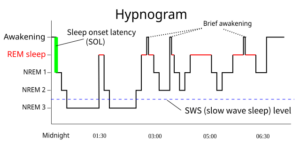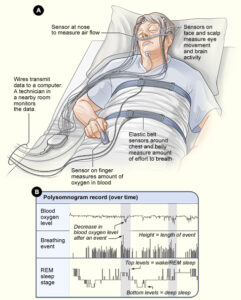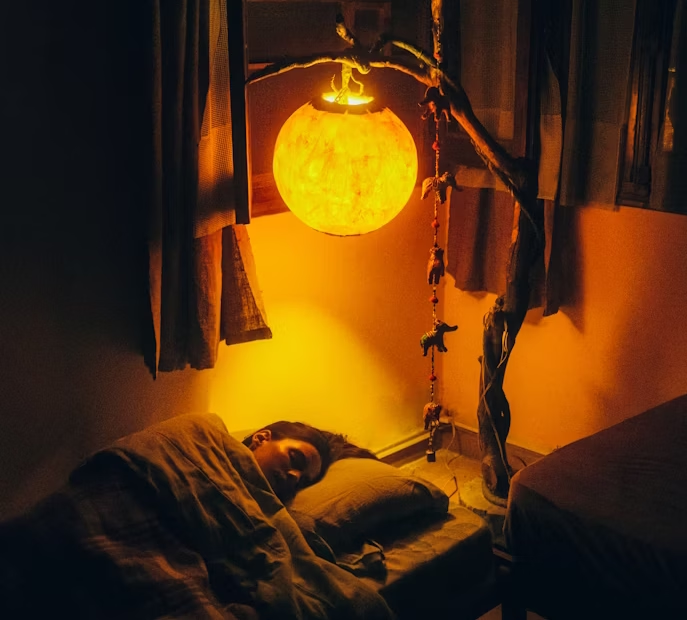How Many Hours of Deep Sleep Do You Need for Optimal Recovery
You wake up after eight hours in bed but feel exhausted. Your mind is foggy. Your body aches. What’s wrong? Chances are, you’re not getting enough deep sleep – the most restorative stage that truly matters for recovery. While everyone focuses on total sleep hours, the quality and type of sleep determine how you actually feel.
Deep sleep is when your body performs its heavy lifting. During this stage, your brain waves slow dramatically, your muscles completely relax, and your body repairs tissues, consolidates memories, and strengthens your immune system. Without sufficient deep sleep, even nine hours in bed won’t leave you feeling rested.
The short answer: Most adults need approximately 1.5 to 2 hours of deep sleep per night, which represents about 13-23% of your total sleep time. So if you sleep 8 hours, you should get roughly 60-110 minutes of deep sleep. However, this varies by age, activity level, and individual needs.
Understanding Sleep Stages and Architecture

Sleep isn’t a single state. Your brain cycles through distinct stages multiple times each night, creating what sleep scientists call your “sleep architecture.” Each complete cycle lasts approximately 90 to 120 minutes, and you typically experience 4 to 6 cycles per night. Understanding these stages helps explain why deep sleep matters so much.
The Four Stages of Sleep
Your Nightly Sleep Journey
Stage 1 (N1): Light Sleep Transition
This is the drowsy phase between wakefulness and sleep. Your muscles start relaxing, your breathing slows, and brain activity shifts from alert beta waves to slower alpha and theta waves. This stage typically lasts only 1-7 minutes. You can wake up easily during this time, and you might experience sudden muscle jerks.
Stage 2 (N2): Core Light Sleep
Your body temperature drops and heart rate slows further. Your brain produces distinctive bursts of activity called sleep spindles, which help with memory consolidation and learning. You spend about 45-50% of your total sleep time in this stage. Stage 2 becomes progressively longer with each cycle throughout the night.
Stage 3 (N3): Deep Sleep – The Restoration Phase
This is the deep sleep stage we’re focusing on. Your brain produces large, slow delta waves. Blood pressure drops significantly, breathing becomes rhythmic and slow, and muscles are completely relaxed. It’s during deep sleep that growth hormone is released, tissues repair, immune function strengthens, and your body consolidates energy. Waking someone from deep sleep is difficult, and if awakened, they’ll likely feel disoriented.
REM Sleep: Dream and Memory Processing
After deep sleep, you enter REM (Rapid Eye Movement) sleep. Your brain becomes almost as active as when you’re awake. Your eyes dart around beneath closed eyelids, vivid dreams occur, and your body temporarily paralyzes most muscles to prevent acting out dreams. REM sleep is crucial for emotional processing, learning, creativity, and memory consolidation. The first REM period lasts only 10 minutes, but later cycles can extend to an hour.
Here’s what happens throughout the night: you get most of your deep sleep during the first half of the night, particularly in the first two sleep cycles. Then, as morning approaches, REM sleep dominates while deep sleep becomes minimal or absent. This pattern is why sleeping late doesn’t necessarily give you more deep sleep – you’ve already gotten most of it early in the night.
90-120 minA complete sleep cycle takes 90 to 120 minutes. Your body needs 4-6 full cycles nightly for optimal recovery and health.
How Much Deep Sleep Do You Actually Need?
The honest answer is nuanced. While research provides general guidelines, your individual deep sleep needs depend on multiple factors. Let’s break down the numbers and what influences them.
The Standard Recommendations
Adults typically spend 10% to 20% of the night in deep sleep, translating to roughly 40 to 110 minutes for those getting the recommended seven to nine hours of total sleep. However, these are population averages, not rigid requirements. Some people naturally get slightly more, others slightly less, and both can be perfectly healthy.
The key insight? Your body self-regulates deep sleep. If you’re sleep-deprived, your brain prioritizes deep sleep in subsequent nights, automatically getting you more of it. This homeostatic process means you don’t need to obsess over exact numbers – your body knows what it needs.
| Total Sleep Time | Expected Deep Sleep (13%) | Expected Deep Sleep (23%) |
|---|---|---|
| 6 hours | 47 minutes | 83 minutes |
| 7 hours | 55 minutes | 97 minutes |
| 8 hours | 62 minutes | 110 minutes |
| 9 hours | 70 minutes | 124 minutes |
Factors That Influence Your Deep Sleep Needs
Age is the biggest factor. Children and teenagers require substantially more deep sleep than adults. Infants spend large portions of their sleep in deep stages to support rapid growth and brain development. Then deep sleep gradually decreases throughout your lifespan. Older adults typically get significantly less deep sleep than young adults, though this reduction doesn’t necessarily indicate a problem.
Physical activity level matters considerably. Athletes engaged in intensive training frequently spend more time in deep sleep, suggesting their bodies need extra recovery time. If you exercise vigorously, work physically demanding jobs, or engage in strength training, you may naturally get more deep sleep.
Recent sleep patterns create variability. After several nights of insufficient sleep, your body will increase deep sleep duration when you finally get adequate rest. Research shows it can take approximately four days to fully recover from just one hour of sleep debt, with most of that recovery happening through increased deep sleep.
Gender might play a role. Some studies suggest women spend proportionally more of their sleep time in deep sleep than men and have more intense deep sleep after sleep deprivation. However, research is still ongoing to understand whether women necessarily need more deep sleep or simply experience it differently.
What Science Says About Individual Variation
A fascinating study on optimal sleep duration found that the mean optimal sleep need for participants was 8.4 hours, but individual needs varied significantly. More importantly, the research showed that while total sleep debt strongly correlated with sleepiness, people recovered primarily through increases in light sleep and REM sleep, not just deep sleep. This suggests all sleep stages work together for complete recovery.
Deep Sleep Benefits: Why This Stage Matters
Deep sleep isn’t just about feeling rested. This stage triggers specific biological processes that can’t happen effectively during other sleep stages or while awake. Understanding these benefits shows why prioritizing sleep quality matters as much as quantity.
Physical Repair and Growth
Your body releases growth hormone during deep sleep, which repairs muscles, rebuilds tissues, and strengthens bones. This is when exercise recovery actually happens.
Immune System Enhancement
Deep sleep strengthens your immune function. Studies show people who don’t get enough deep sleep are more susceptible to infections and take longer to recover from illness.
Memory Consolidation
While REM sleep handles procedural and emotional memories, deep sleep is crucial for declarative memory – facts, events, and information you learned during the day.
Energy Restoration
Your body replenishes energy stores during deep sleep. This is when adenosine (the chemical that makes you tired) gets cleared from your brain, so you wake up feeling alert.
Brain Detoxification
The glymphatic system – your brain’s waste clearance system – is most active during deep sleep, removing toxic proteins that accumulate during waking hours.
Cellular Maintenance
DNA repair and cellular regeneration occur predominantly during deep sleep, helping prevent cellular damage and supporting healthy aging processes.
What Happens Without Enough Deep Sleep
Chronic deep sleep deficiency creates a cascade of problems. You might sleep eight hours but wake feeling unrefreshed. Insufficient deep sleep impairs physical recovery, weakens immune response, reduces cognitive performance, and affects mood regulation. You become more susceptible to infections, take longer to recover from workouts, and struggle with focus and memory.
Over time, persistent deep sleep deprivation contributes to more serious health issues. Research links inadequate deep sleep with increased risks of obesity, type 2 diabetes, cardiovascular disease, and accelerated cognitive decline. Your body simply can’t maintain optimal health without this critical recovery phase.
How to Know If You’re Getting Enough Deep Sleep

The challenge with deep sleep is that you can’t consciously experience it – you’re, well, deeply asleep. So how do you know if you’re getting enough? Let’s explore both subjective indicators and objective methods.
Subjective Signs to Monitor
The simplest assessment is asking yourself: Do I feel genuinely refreshed when I wake up? If your total sleep time is adequate (7-9 hours for adults) but you experience symptoms of sleep deprivation like waking unrefreshed, difficulty focusing, or struggling with everyday activities, it could indicate insufficient deep sleep.
Other indicators include:
- Morning grogginess that lingers: Taking hours to feel fully awake suggests poor sleep quality
- Difficulty concentrating: Mental fog and focus problems often stem from inadequate deep sleep
- Physical fatigue despite rest: Your muscles ache and you lack energy for physical activities
- Increased irritability: Mood regulation suffers when deep sleep is insufficient
- Getting sick frequently: Your immune system relies on deep sleep for optimal function
- Slow recovery from exercise: Muscles stay sore longer when deep sleep is inadequate
Objective Measurement Tools
Sleep trackers – both wearables and bedside devices – can estimate your time in different sleep stages. However, take these measurements with a grain of salt. Consumer sleep trackers are often inaccurate when estimating sleep stages, and even professional polysomnography (sleep studies) have only about 80% agreement between experts.
That said, sleep trackers can show useful trends over time. If your tracker consistently shows very low deep sleep percentages (under 10% regularly), combined with subjective symptoms of poor sleep, it’s worth investigating further. The most valuable aspect of sleep tracking isn’t the exact numbers – it’s identifying patterns and seeing if changes in your habits correlate with feeling better.
How to Increase Deep Sleep Naturally
The good news: you have significant control over your deep sleep quality. While you can’t directly command your brain to produce more deep sleep, you can create optimal conditions that naturally increase it. Let’s explore evidence-based strategies that actually work.
Prioritize Total Sleep Duration First
This is the foundation that everything else builds on. The most effective way to get more deep sleep is simply to get enough total sleep. When you consistently sleep 7-9 hours, your body automatically allocates the appropriate amount of time to deep sleep based on your needs.
Remember, most deep sleep occurs in the first half of the night. If you only sleep 5-6 hours, you’re missing entire sleep cycles that would include deep sleep. Going to bed earlier matters more than sleeping later, since those first cycles contain the highest concentration of deep sleep.
Establish Consistent Sleep-Wake Times
Research shows that going to bed earlier and maintaining a regular sleep schedule is linked to better health outcomes and improved sleep quality. Your circadian rhythm thrives on predictability. When you go to bed and wake up at the same time daily (yes, even on weekends), your body learns when to prepare for sleep and when to wake naturally.
Consistency strengthens your sleep drive and optimizes hormone production. Your body starts releasing melatonin at the right time, cortisol peaks when you need to wake, and the entire system operates more efficiently. This regularity naturally supports deeper, more restorative sleep.

Your Deep Sleep Optimization Checklist

Dietary Factors That Influence Deep Sleep
What you eat affects how you sleep. Studies suggest that eating more fiber may help increase deep sleep time. A balanced diet rich in whole foods, lean proteins, and complex carbohydrates supports better sleep architecture overall.
Avoid heavy meals within 2-3 hours of bedtime. Large meals close to sleep time can cause discomfort and keep your digestive system active when it should be resting. Similarly, while staying hydrated is important, excessive fluid intake before bed can disrupt sleep with bathroom trips that fragment your sleep cycles.
Address Underlying Sleep Disorders
Sometimes, despite your best efforts, deep sleep remains elusive. Certain medical conditions and sleep disorders specifically impact deep sleep. Sleep apnea, for example, causes breathing interruptions that prevent you from entering or maintaining deep sleep stages. Other conditions like restless leg syndrome, chronic pain, or certain medications can also interfere.
If you consistently follow good sleep hygiene but still feel unrefreshed after adequate sleep time, consult a healthcare provider. They may recommend a sleep study to identify any underlying disorders that require specific treatment.
“Deep sleep is when your body and mind engage in a deep restorative process. During this stage, your body repairs tissues, builds bone and muscle, and strengthens the immune system. It’s during deep sleep that the body builds up energy for the next day.”
The Connection to Overall Wellness and Longevity
Deep sleep doesn’t exist in isolation from your other health habits. It’s intimately connected to every aspect of your wellbeing. Quality sleep is one of the foundational lifestyle habits that transforms health and longevity, working synergistically with nutrition, exercise, stress management, and other healthy practices.
Think of it this way: exercise creates a need for recovery that deep sleep fulfills. Stress management techniques calm your nervous system, making deep sleep more accessible. Proper nutrition provides the building blocks your body uses during deep sleep repair processes. Sleep, circadian rhythms, and lifestyle habits form an interconnected web where improving one aspect often enhances the others.
The Long-Term Picture
Consistent, high-quality deep sleep over years and decades provides compounding health benefits. Your body maintains stronger immune function, reducing lifetime disease burden. Cognitive performance stays sharper longer, potentially reducing dementia risk. Physical recovery remains more efficient, supporting active aging. Hormone balance stays more optimal, supporting metabolic health.
Conversely, chronic deep sleep deprivation accelerates aging processes. Research links long-term sleep debt with increased risks of obesity, diabetes mellitus, and mood disorders. The good news? These relationships work both ways. Start improving your deep sleep now, and you start accumulating health benefits that pay dividends for decades.
What Recovery Looks Like
Research shows that recovering from even one hour of sleep debt takes approximately four days. During recovery, your body prioritizes the sleep stages it needs most – often light sleep and REM first, then deep sleep. Be patient with yourself. Consistency matters more than perfection. Each night of better sleep moves you toward optimal recovery, even if progress feels gradual.
Frequently Asked Questions
Can you catch up on deep sleep during weekends?
Partially, but not completely. While sleeping longer on weekends does help reduce sleep debt, you can’t fully compensate for chronic weeknight deprivation with two days of extra sleep. Your body will prioritize deep sleep during recovery sleep, but establishing consistent sleep patterns throughout the week works better than the feast-or-famine approach.
Do sleep supplements increase deep sleep?
Research on melatonin’s impact on deep sleep specifically is mixed. Melatonin primarily helps with sleep timing and falling asleep, not necessarily increasing deep sleep duration. Other supplements like magnesium and glycine show some promise, but the evidence is still emerging. Focus on behavioral changes first, as they have stronger evidence for improving deep sleep quality.
Is it normal for deep sleep to decrease with age?
Yes, absolutely. Deep sleep naturally decreases as you age, especially after middle age. Older adults typically get less deep sleep than younger adults, and this is a normal part of aging. However, older adults don’t necessarily need the same amount of deep sleep as younger people – their sleep architecture changes, but quality sleep remains important.
Should I wake up if I’m in deep sleep?
Ideally, no. Waking from deep sleep causes “sleep inertia” – that groggy, disoriented feeling that can last 30 minutes or more. This is why waking naturally (or with a gradual alarm during lighter sleep) feels better than jolting awake from deep sleep. Some advanced alarm apps attempt to wake you during lighter sleep phases, though their accuracy varies.
Can medication affect my deep sleep?
Many medications can impact sleep architecture. Some antidepressants, antihistamines, beta blockers, and pain medications may alter the amount or quality of deep sleep. If you suspect your medication affects your sleep, discuss alternatives with your healthcare provider. Never stop prescribed medications without medical guidance, but do advocate for solutions that support both your health condition and sleep quality.
Your Action Plan for Better Deep Sleep
Improving your deep sleep doesn’t require expensive gadgets or drastic lifestyle overhauls. Start with these evidence-based steps:
- Commit to a consistent sleep schedule – Same bedtime and wake time daily, even weekends, for at least two weeks
- Get morning sunlight exposure – 10-30 minutes outdoors within one hour of waking
- Cut evening screen time – No devices 1-2 hours before bed, or use blue light filters
- Create a relaxing pre-bed routine – 30-60 minutes of calming activities like reading or gentle stretching

Bedroom temperature 60–67°F (15–19°C), blackout curtains, and quiet reduce awakenings and support deep sleep. Optimize your sleep environment – Cool (60-67°F), dark, and quiet bedroom
- Stop caffeine by early afternoon – No coffee, tea, or energy drinks after 2 PM
- Exercise regularly but not late – Finish vigorous workouts 3+ hours before bed
- Monitor how you feel – Track your energy, focus, and overall wellbeing to gauge improvement
Remember, your body knows how to sleep well – you just need to create the right conditions for it to happen. Deep sleep is your body’s natural repair mechanism, honed by millions of years of evolution. When you align your habits with your biology’s needs, deep restorative sleep follows naturally.
The investment you make in sleep quality pays dividends in every aspect of your life. Better physical recovery, sharper mental performance, stronger immunity, improved mood, and enhanced longevity – all stem from those precious hours of deep sleep each night. Prioritize them, and watch how much better you feel.
References
- Sleep Foundation. (2025). How Much Deep Sleep Do You Need? Sleep Foundation.
- Cleveland Clinic. (2023). Sleep: What It Is, Why It’s Important, Stages, REM & NREM. Cleveland Clinic Health Library.
- Sleep Foundation. (2025). Stages of Sleep: What Happens in a Normal Sleep Cycle? Sleep Foundation.
- WebMD. (2024). Stages of Sleep: REM & Non-REM Sleep. WebMD Medical Reference.
- Patel, A. K., et al. (2024). Physiology, Sleep Stages. StatPearls Publishing.
- Sleep Foundation. (2025). What Happens During NREM Sleep? Sleep Foundation.
- Vyazovskiy, V. V., & Delogu, A. (2014). NREM and REM Sleep: Complementary Roles in Recovery after Wakefulness. The Neuroscientist, 20(3), 203-219.
- Desroziers, K., et al. (2024). Exploring the Role of Circadian Rhythms in Sleep and Recovery: A Review Article. Cureus, 16(6), e61568.
- Kitamura, S., et al. (2016). Estimating individual optimal sleep duration and potential sleep debt. Scientific Reports, 6, 35812.
- Kitamura, S., et al. (2016). Estimating individual optimal sleep duration and potential sleep debt. Scientific Reports, 6, 35812.
- Sleep Foundation. (2025). How to Get More Deep Sleep: Tips for a Restful Night. Sleep Foundation.
- RISE Science. (n.d.). How to Get More Deep Sleep? 16 Tips From a Sleep Expert. RISE Science Blog.
- Hers. (n.d.). How to Increase Deep Sleep: 9 Easy Tips. Hers Health Blog.
- Cleveland Clinic. (2025). Simple Habits To Improve Deep Sleep and REM Sleep. Cleveland Clinic Health Essentials.
- Healthline. (2024). 15 Proven Tips to Sleep Better at Night. Healthline Medical Review.
- Healthline. (2024). How Much Deep, Light, and REM Sleep Do You Need? Healthline Medical Review.
- Calm. (2025). How to get more deep sleep? Try these 8 sleep tips. Calm Blog.
- The Insomnia and Sleep Institute. (2025). Are You Getting Enough DEEP Sleep? Sleep Institute of Arizona.
- Stony Brook Medicine. (2024). How Much Deep Sleep Do You Need? Stony Brook Medicine Health News.
Related Articles
- Lifestyle Foundations for Optimal Wellness: Proven Habits That Transform Health and Longevity
- Your Circadian Body Clock: How Sunlight Regulates Sleep, Mood, and Health
- REM Sleep: How Much Do You Need & Average Deep Sleep Per Night Explained
- High Cortisol Levels: Causes, Symptoms & Natural Treatment Guide
About the Author
The Remedy Verified Team translates complex metabolic science into clear, practical strategies for everyday health.
Medical Disclaimer
This article provides general information and should not replace professional medical advice, diagnosis, or treatment. Always consult qualified healthcare providers before making significant changes to your sleep routine or lifestyle. Individual sleep needs vary, and what works for one person may not be appropriate for another. If you have sleep disorders, chronic health conditions, or take medications that affect sleep, speak with your healthcare provider before implementing new sleep strategies. Persistent sleep problems may indicate underlying health conditions that require professional diagnosis and treatment. The information about sleep stages and deep sleep is educational and should be used in conjunction with personalized medical guidance based on your individual health status.




